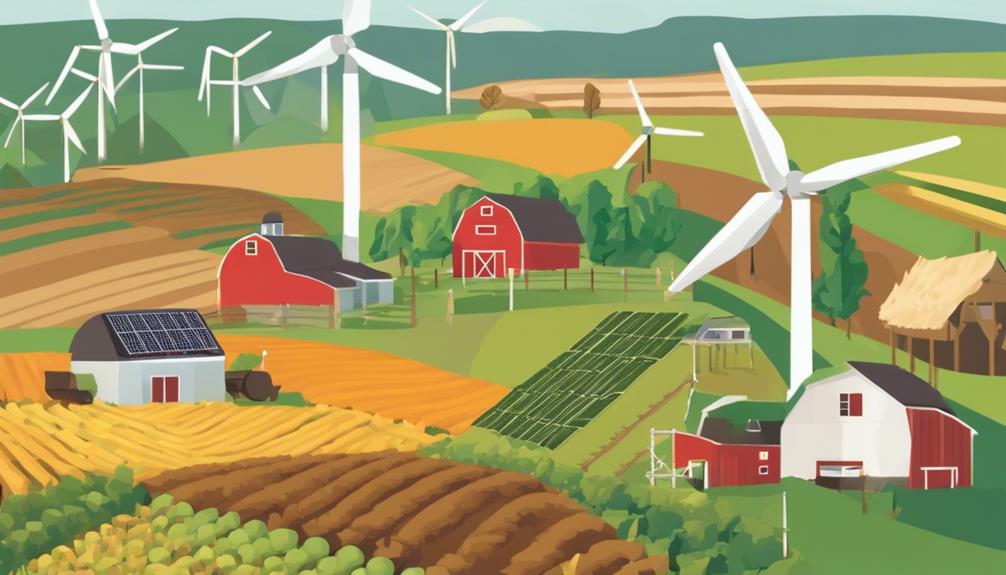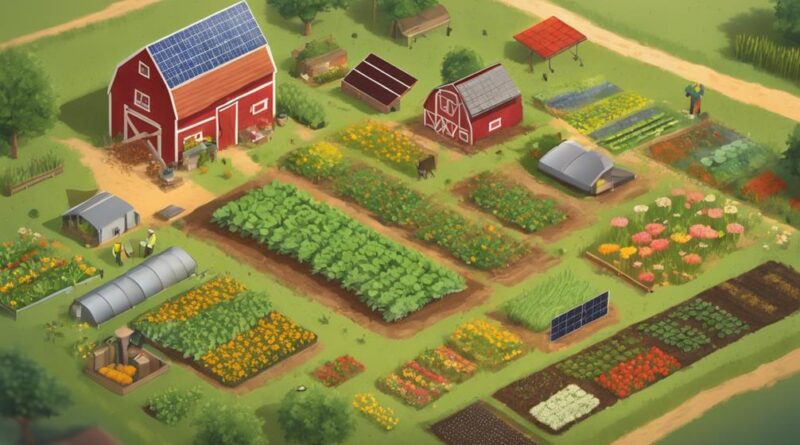Why Is Sustainability Vital in Farming Practices?
Prioritizing sustainability in farming ensures long-term land health, boosts biodiversity, minimizes environmental harm, produces healthier food, and benefits farmers economically while tackling climate change. Enhancing soil fertility optimizes crop yields and reduces reliance on external inputs. Sustainable practices lower the carbon footprint, conserve water, and support diverse ecosystems. Healthier, nutrient-rich produce is cultivated through organic methods. Economic gains and market demand for sustainable products benefit farmers. Mitigating climate change by sequestering carbon and opting for renewable energy sources is crucial. Sustainability in farming fosters resilience and viability for the future of agriculture.
Increased Soil Fertility
To enhance crop yields sustainably, you must actively replenish and maintain soil fertility through strategic practices. Soil health plays a crucial role in agricultural productivity, serving as the foundation for successful crop growth. One key aspect of enhancing soil fertility is optimizing nutrient cycling within the soil. Nutrient cycling involves the movement and exchange of nutrients between organic matter, soil, and living organisms, creating a dynamic system that sustains plant growth.
Maintaining soil health through effective nutrient cycling is essential for long-term agricultural sustainability. When nutrients are efficiently recycled within the soil, plants can access the essential elements they need for growth. This process not only benefits crop yields but also reduces the need for external inputs like chemical fertilizers, thus promoting a more environmentally friendly farming approach.
Reduced Environmental Impact
Minimizing the environmental impact of farming practices is imperative for ensuring the long-term sustainability of agricultural systems. To achieve this goal, it's crucial to focus on reducing the carbon footprint and maintaining ecosystem balance.
Here are five key strategies to help you in reducing the environmental impact of farming practices:
- Adopting Sustainable Agriculture Techniques: Implementing practices such as crop rotation, cover cropping, and reduced tillage can help sequester carbon in the soil, thereby lowering the overall carbon footprint of farming operations.
- Efficient Water Management: By employing precision irrigation methods and water-saving technologies, you can reduce water wastage and minimize the impact on local ecosystems.
- Promoting Agroforestry: Integrating trees and shrubs into agricultural landscapes not only helps sequester carbon but also enhances biodiversity and improves ecosystem services.
- Utilizing Renewable Energy Sources: Switching to renewable energy sources like solar or wind power for farm operations can significantly reduce greenhouse gas emissions and lessen the environmental impact of farming.
- Protecting Natural Habitats: Preserving natural habitats within and around farms is essential for maintaining ecosystem balance, promoting biodiversity, and ensuring the long-term sustainability of agricultural systems.
Enhanced Biodiversity
Enhanced biodiversity within agricultural systems plays a crucial role in bolstering ecosystem resilience and improving overall sustainability. By focusing on pollinator protection and ecosystem restoration, farmers can create a more balanced and resilient environment that benefits both crops and wildlife.
Protecting pollinators such as bees and butterflies is essential for agricultural productivity. These creatures play a vital role in the pollination of many crops, contributing to increased yields and quality. Implementing practices that support pollinator populations, such as planting diverse flowering plants and reducing pesticide use, can have significant positive impacts on crop production.
Furthermore, incorporating wildlife habitat and native species integration into farming landscapes promotes biodiversity and ecological balance. By creating space for native plants and animals to thrive, farmers can enhance the overall health of their ecosystems. This integration can also help control pests naturally, reducing the need for chemical pesticides that can harm the environment.
In addition to supporting biodiversity, these practices contribute to ecosystem restoration by rebuilding natural habitats and fostering a more sustainable agricultural model. By creating a harmonious balance between farming activities and the surrounding ecosystem, farmers can ensure the long-term health and productivity of their land. Prioritizing biodiversity within agricultural systems isn't only beneficial for the environment but also for the resilience and success of farming practices.
Conservation of Water Resources
Conserving water resources in agricultural practices is paramount for ensuring long-term sustainability and productivity. In the realm of farming, water efficiency and appropriate irrigation techniques play a crucial role in optimizing crop yields while minimizing water wastage.
Here are five key points to consider when aiming to conserve water resources:
- Drip Irrigation Systems: Implementing drip irrigation systems can significantly reduce water usage by delivering water directly to the plant roots, minimizing evaporation and runoff.
- Soil Moisture Monitoring: Utilizing soil moisture monitoring technologies helps farmers determine the exact water needs of their crops, allowing for precise irrigation scheduling and avoiding overwatering.
- Mulching: Applying mulch around plants helps retain soil moisture, reducing the frequency of irrigation and overall water consumption.
- Crop Selection: Opting for drought-resistant crop varieties can contribute to water conservation efforts by requiring less irrigation compared to water-intensive crops.
- Water Recycling: Establishing systems for collecting and recycling water runoff or implementing rainwater harvesting techniques can supplement irrigation needs and reduce reliance on freshwater sources.
Healthier Food Products
To promote healthier food products, farmers can implement sustainable farming practices that prioritize soil health and crop diversity. By focusing on these aspects, farmers can grow nutrient-rich crops that benefit both consumer health and the environment. Nutrient-rich crops are essential for providing essential vitamins, minerals, and antioxidants that support overall well-being. Through sustainable farming techniques such as crop rotation, cover cropping, and natural fertilization methods, farmers can enhance the nutrient content of their produce.
Organic certification plays a crucial role in ensuring the quality and health benefits of food products. Organic certification guarantees that crops are grown without synthetic pesticides, herbicides, or genetically modified organisms, resulting in cleaner and safer food options for consumers. Studies have shown that organic fruits and vegetables tend to have higher levels of antioxidants and lower levels of pesticide residues compared to conventionally grown produce.
Economic Benefits for Farmers
Implementing sustainable farming practices can lead to significant economic benefits for farmers, fostering long-term profitability and resilience in the agricultural sector. By adopting sustainable methods, farmers can enhance their financial standing while contributing to a more sustainable future.
Here are some key economic advantages that farmers can experience:
- Cost Savings: Sustainable farming practices often involve reducing the reliance on expensive chemical inputs and machinery, leading to lower production costs.
- Improved Yields: Through practices such as crop rotation, cover cropping, and integrated pest management, farmers can boost their yields over the long term, resulting in increased profits.
- Market Demand: Consumers are increasingly seeking out sustainably produced food products, creating a growing market demand that farmers can tap into.
- Premium Prices: By meeting this demand for sustainable products, farmers may be able to command premium prices for their goods, enhancing their profitability.
- Long-Term Resilience: Sustainable farming practices help build resilience against market fluctuations, climate change impacts, and other uncertainties, ensuring a stable income for farmers in the long run.
Climate Change Mitigation

Minimizing greenhouse gas emissions through sustainable agricultural practices is crucial for mitigating the impacts of climate change on farming ecosystems. Agriculture is a significant contributor to global greenhouse gas emissions, with activities like livestock production, fertilizer use, and land use changes releasing large amounts of carbon dioxide, methane, and nitrous oxide into the atmosphere.
Implementing practices that focus on carbon sequestration, such as cover cropping, agroforestry, and reduced tillage, can help offset these emissions by capturing and storing carbon in the soil.
Renewable energy sources also play a vital role in climate change mitigation within agriculture. Transitioning to renewable energy options like solar panels, wind turbines, and bioenergy production not only reduces the carbon footprint of farming operations but also helps to decrease reliance on fossil fuels.
Long-Term Viability for Farming
For farming to remain viable in the long term, sustainable practices must be prioritized to ensure environmental, economic, and social resilience. Implementing sustainable agriculture practices is crucial not only for the well-being of our planet but also for the future of food production. Here are five key factors to consider when discussing the long-term viability of farming:
- Enhanced Soil Health: Sustainable practices such as crop rotation, cover cropping, and reduced tillage help improve soil structure, fertility, and overall health, leading to improved crop yield over time.
- Water Conservation: Efficient irrigation systems, rainwater harvesting, and proper water management techniques contribute to sustainable water use, ensuring long-term access to this critical resource.
- Biodiversity Preservation: By promoting diverse cropping systems and preserving natural habitats within and around farms, biodiversity is maintained, leading to more resilient ecosystems and increased pollination for higher crop yields.
- Reduced Input Dependency: Sustainable farming aims to minimize reliance on external inputs like chemical fertilizers and pesticides, fostering self-sufficiency and reducing production costs in the long run.
- Community Engagement: Long-term farming viability is also dependent on social factors. Engaging with local communities, supporting fair labor practices, and contributing to rural development are essential aspects of sustainable agriculture practices.
Conclusion
In conclusion, practicing sustainable farming methods is crucial for the long-term viability of agriculture. By focusing on increased soil fertility, reduced environmental impact, enhanced biodiversity, conservation of water resources, and healthier food products, farmers can't only mitigate climate change but also reap economic benefits.
Embracing sustainability in farming practices isn't just an option, but a necessity for ensuring a resilient and prosperous agricultural future.
